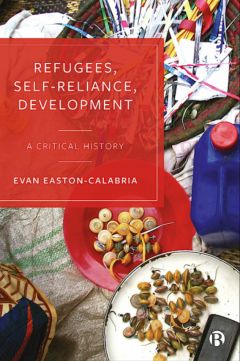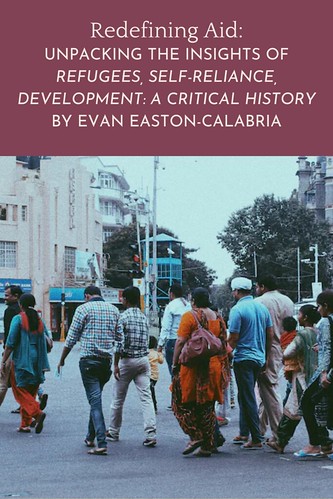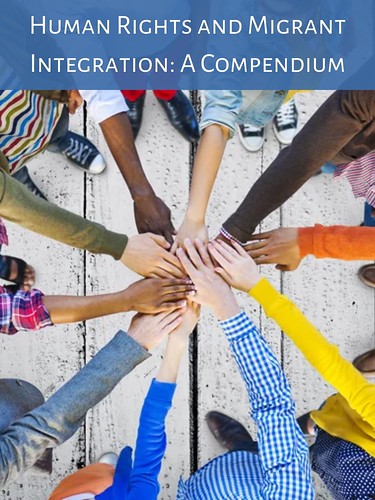Redefining Aid: Unpacking the Insights of ‘Refugees, Self-Reliance, Development: A Critical History’ by Evan Easton-Calabria
Refugees, Self-Reliance, Development: A Critical History by Evan Easton-Calabria, published by Bristol University Press, offers a comprehensive exploration of the complex relationship between refugees and their experience of integrating in new communities.

In this book, Easton-Calabria explores the historical evolution of policies and practices surrounding refugee assistance, and sheds a light on the multifaceted interplay of humanitarian efforts and the aspirations of displaced populations.

Self-Reliance
The author critically examines the concept of self-reliance as a guiding principle for refugees when they arrive in their host country. Through careful analysis, Easton-Calabria delves into the narrative of power dynamics and embedded in the discourse of self-reliance.
This is done through the author unveiling the power relations that shape the experiences of displaced populations, as well as the decision-making processes and structures within the humanitarian system—highlighting how they have an influence on the autonomy and agency of refugees in host societies.
Easton-Calabria points out how certain actors, such as governmental, non-governmental, and international organisations, have an overarching influence over the lives of refugees. The author recognises and challenges the power dynamics currently in place through shedding a light on the overlooked power imbalances of development agencies and governments as the sole arbiters of refugee well-being. The book calls for a revaluation of the existing pattern and urges a more inclusive approach which recognises the needs and challenges of integrating refugees in their host community.
The author offers suggestions regarding migrant integration to governments, local authorities, and NGOs to make the aid provided to refugees more equitable and empowering to assisting refugees through their journey of integration.
While this is explored throughout the book, the discourse of self-reliance is clearly also a double-edged sword. When this is mentioned, the author means this by the fact that self-reliance provides opportunities for refugees to reclaim agency in their host country, and to be able to stand on their own two feet without too much aid. However, governments, NGOs, and local authorities tend to subject refugees to constrains of external expectations. This is done through policies introduced by governments which also hold refugees back from successful integration within their host countries.
By unpacking complex power dynamic in self-reliance, the book offers an insightful understanding of the complexities of integration and self-reliance in the context of refugees in their host countries. The author urges governments, NGOs, and local authorities to re-evaluate current approaches to better address the needs of displaced individuals while integrating in their host communities.
Rethinking Aid: Critical Takeaways
Evan Easton-Calabria offers a profound insight into reshaping the understanding of the relationships between refugees, self-reliance, and integration development.
1. Limitations to Traditional Approaches
The main takeaway from the author’s critical examination is that there are many limitations to using traditional approaches for refugee integration assistance. The limitations and unintended consequences of policies overlooking the resilience and agency of displaced populations is especially highlighted throughout. Easton-Calabria encourages the reader to reconsider predetermined notions about the role of refugees in their own development of integration, as well as challenges the overprotective nature of many humanitarian interventions.
2. Historical Development of Integration Policy
Additionally, the author includes a historical analysis which offers a greater understanding of the development of the concepts of self-reliance and development, as well as how integration policy has been shaped over the years.
Through illustrating the socio-political factors that have shaped the evolution of refugee integration support, the reader is encouraged to have a better understanding of the positive and negative inputs from governments, NGOs and international institutions.
3. Acknowledging Diversities
The author highlights the importance of acknowledging the diverse experience and aspirations of refugees when integrating in their host communities. There is an emphasis in the book for a more inclusive and participatory approach to aiding the personal development of refugees and their integration efforts.
In the Context of Scotland
As a nation with its own unique socio-political landscape, Scotland can draw some valuable lessons from the book’s critical analysis of refugee integration assistance and development practices. The emphasis of revaluating traditional approaches and recognising the agency of displaced populations can guide Scottish policymakers towards more inclusive integration policies.
While the New Scots Integration Strategy has a positive effect on migrant and refugee communities across Scotland, as mentioned in some of my previous articles, there is still room for change. This book provides an insight of what can be done to further integration policies, such as the New Scots policy.
After further consideration, the book has illustrated suggestions of what can be done to further improve such integration policies introduced in Scotland.
For example, practitioners working with refugee communities can be inspired to adopt an even more participatory method to acknowledge the diverse experiences and aspirations of those seeking refuge in Scotland. As such, being even more in touch with refugee communities can give practitioners a more in-depth understanding of what is needed and what can be improved, in terms of assistance for integration.
In this book, researchers and policy makers in Scotland can learn more about of the historical context and evolution of integration policy for refugees. Through delving deeper into this topic, a foundation of further studies can offer more insight into what still needs done to support refugees throughout their development in their host country in a local and global context.
Easton-Calabria’s work offers a thoughtful and adaptable approach to refugee issues in the context of development and self-reliance. Through fostering a more empathetic and effective response that aligns with the values and aspirations of Scottish Communities, policy makers can offer an even more effective integration strategy for refugees.
Overall, Refugees, Self-Reliance, Development: A Critical History encourages an in-depth understanding of the complex dynamics at play when refugees are integrating in host communities, and how self-reliance has an impact on this. The author affectively urges policymakers, practitioners, and researchers to adopt a more empathetic perspective in their efforts to offer aid through the challenges displaced individuals face in their host country.
Evan Easton-Calabria is a research associate at the Refugee Studies Centre and a senior researcher at the Feinstein International Centre, Tufts University. Previously she was Principal Investigator of the RSC research project, ‘Responses to Crisis Migration in Uganda and Ethiopia: Researching the role of local actors in secondary cities,’ funded through the Cities Alliance/UNOPS, and a John Fell Fund grant, ‘Digital Livelihoods for Refugees? Exploring pathways to the new world of work in Nairobi and Tel Aviv.’ She is also lead editor of the Refugee Studies Centre’s research dissemination platform Rethinking Refuge. Prior to this she worked on the Refugee Economies Programme's research project on refugee-led social protection.

Her work with refugees began in Kampala, Uganda, in 2011 and has led her to research historical and contemporary refugee self-reliance assistance. Recent work traces the changes and continuities of refugee self-reliance assistance and refugees’ involvement with development since the 1920s. In 2015, she was Principle Investigator for the National Geographic Early Career Grant project, ‘Innovation and the Art of Self-Reliance: Artistic Livelihoods of Kampalan Refugees,’ and in 2015-2016 for the research project, ‘Researching Refugee-Run Micro-Finance,’ funded by the Humanitarian Innovation Fund. While living in Uganda, she co-founded a grassroots organisation with refugees in Kampala that provides livelihoods training and support to urban refugees. Through academic research and piloting grassroots self-reliance projects with refugee communities in Kampala, she aims for her work to contribute to Refugee Studies and inform contemporary refugee policy on livelihoods and self-reliance. She holds a Masters and Doctorate in International Development from the University of Oxford.
Please click the photo below to read more articles in this series:
Esmee Johnston is the Human Rights and Migrant Integration Editor at Wandering Educators. Motivated by the desire to make a positive impact in the world, is currently studying her master’s degree in Human Rights and Diplomacy at the University of Stirling. This degree is taught in partnership with UNITAR, offering the opportunity for her to broaden her knowledge on human rights matters. She is very passionate about the human rights of migrants and the importance migrant integration has on this topic.






















